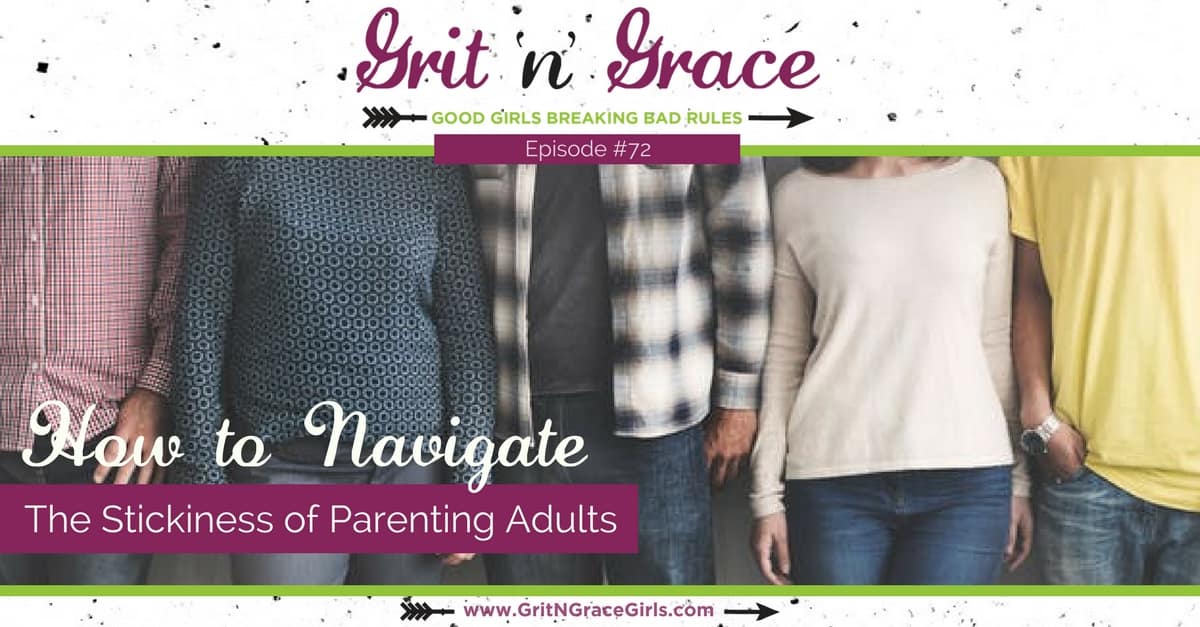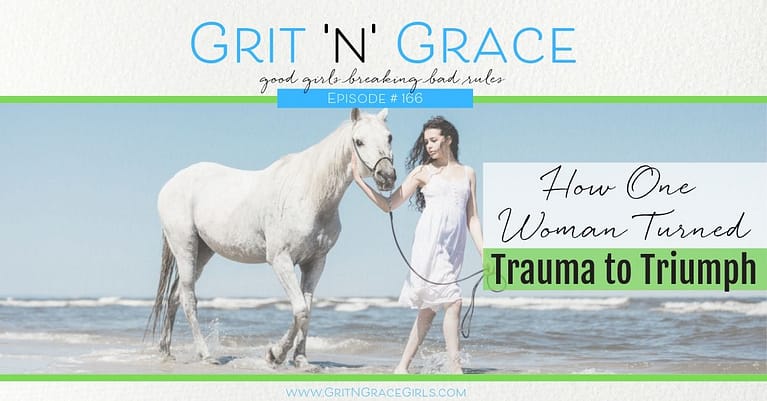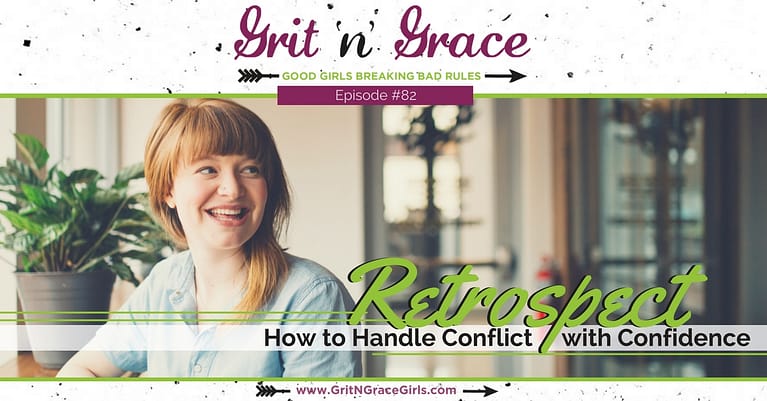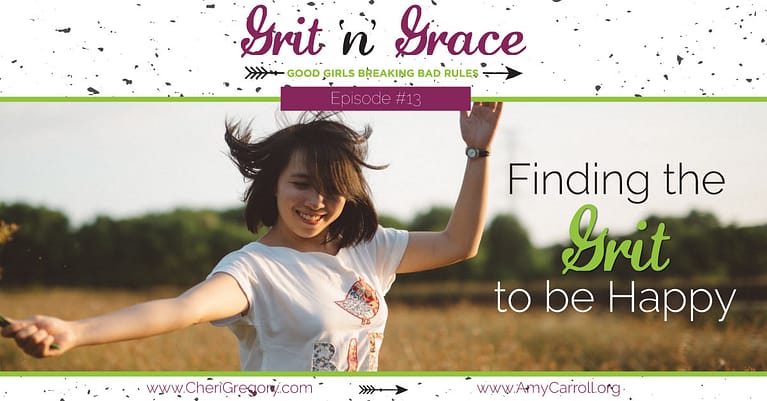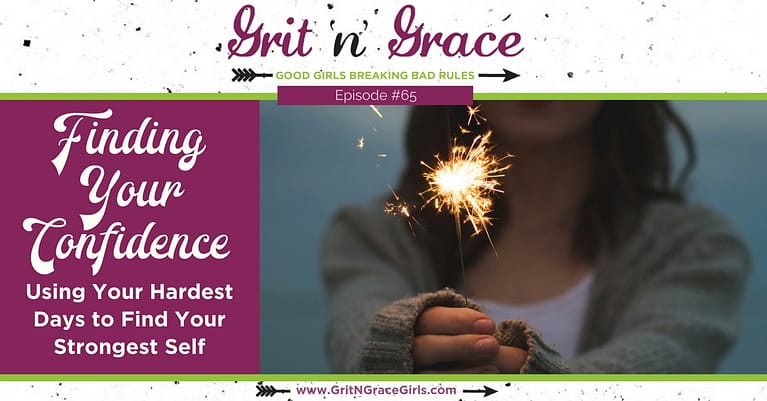Cheri and Amy are both in the stage of parenting adults, and it’s a sticky blessing. They process the right questions to ask, some scripts to perfect and healthy ways to examine the past when all the wheels have fallen off. If you’re a new mom, this will help you plan ahead while moms in the adult-parenting phase will feel the camaraderie of dwelling together in the trenches!
(This page contains affiliate links. Your clicks and purchases help support Grit 'n' Grace at no extra charge to you.)
Recommended Resources
Downloads
Your Turn!
- When has asking “why me” caused you to become downright whiney?
- What’s one quick ‘n’ easy way you’ve found to count your blessings — even when you’re in midst of a crisis?
- What is God teaching you about boundaries during this season of your life?
Transcript — scroll to read here (or download above)
* * * * *
Grit ‘n’ Grace: Good Girls Breaking Bad Rules
Episode #72: How to Navigate the Stickiness of Parenting Adults
Amy
How was your weekend, friend?
Cheri
Oh my goodness! I got to spend time with the most amazing women at a retreat!
Amy
Really? What made them so amazing?
Cheri
You know, they were so open to learning, so eager for new tools, and willing to learn all new ways of thinking! I was especially impressed by the “older women” who are just now breaking up with Perfect.
Amy
Wow. It’s truly one of my values to be a lifetime learner, so I really respect that. One thing that’s hard for me though (now that I’M the older women… is realizing that I worked and worked to do something that I thought was right at the time only to realize that I had been doing more damage than good.
Cheri
These women were SO GRATEFUL that God is making CHANGES in their lives, and that they’re finding so much freedom!
Amy
That’s incredibly healthy! Seeing the benefits of change even when we realize it means turning away from things we valued at one point. That’s true freedom!
Cheri
Well, this is Cheri Gregory…
Amy
…and I’m Amy Carroll…
Cheri
…and you’re listening to “Grit ‘n’ Grace: Good Girls Breaking Bad Rules.”
Amy
Today, we’re reflecting on what we learned from our conversation with Lori Wildenberg, author of Messy Journey: How Grace and Truth Offer the Prodigal a Way Home.
Cheri
Okay, so I’ll just say that probably the biggest takeaway I had from our time with Lori was this alternate question to ask…
Amy
Oh. Powerful.
Cheri
Instead of asking why, and as I thought about it, I realized, well, first of all, my thought was, “Well, why do we even ask why?” When something happens with our child, or they make a choice that wasn’t what we were hoping to…and our first thought is, “Why?” And, of course, she brought up that control word again.
Amy
Mercy.
Cheri
But then, I realized, I go one level deeper. I don’t just ask why…I often move on to “why me?” Why does this have to happen to ME as a parent, to MY child? And there’s just such a, boy, I hate to say entitlement, but I can’t think of another word, but there’s almost a sense of, “This kind of thing happens to other parents, and that’s normal. But it shouldn’t happen to me of all people.”
Amy
Yes. Yes. Well, the whole ME gets to the whole heart of it, doesn’t it? It’s that point of view, the WHY ME, centered on me. And what she said for us to do flipped that and made us refocus on God, and what’s for His glory. Yeah, that was so painful even to listen to again.
Like, whoa. It really shed a bright light on my heart.
Cheri
So instead of why is this happening or why did they make that choice…instead of why ME…and you know, when you say “why me,” it sounds whiney. Why me is whiney.
<Laughter>
Amy
Wow Cheri! Hush. The knife just got driven a little deeper.
Cheri
And so the better question… you pointed out, it’s just such a perspective shift…the better question is, “How can we honor God in this situation?” And that is so challenging, because it’s so easy for me to get stuck in the why me, why me, being whiney, whiney… and, but that whole sense of that why did this happen to me OF ALL PEOPLE, has this implication that somehow it shouldn’t have happened. And I think what gets me in so much trouble is, and we’re back to your pictures of perfection…when what I expect and what I get are different. And what she was encouraging us to do is to see that that’s just going to be happening; it’s just a part of life. And when that happens to ask the question how can we honor God? How can we honor God when what we expect and what we get are so very different? Why is it so much better to ask, “How can we honor God” than, “Why is this happening to me?”
Amy
Well it really does, I think, shift our focus, number one, to God. And when we start thinking about how can I honor God in this we have to start looking for the positives instead of hyper-focusing on the negatives. And there’s always blessings to be had. You know I’ve been sharing with you this morning that I have crazy brain right now and for just a variant of reasons. And I was talking to my husband this morning and I said, “I have got to stop talking about this and start counting my blessings.” It’s the same in any crisis with our children is that there are always blessings. You know I have a friend that’s going through a really hard time with her son, and she called him. He and his wife are separated, and she said, “We love you what can we do for you?” That way of thinking really is so revealing especially for perfectionists. We just want the formula. I even said it to my husband this morning, I want to do it right so badly. How can I keep flopping like this?
Cheri
I understand!
Don’t we feel like that as parents when our kids implode? It’s like, man, I wanted to do this right so badly; how could this happen up in my house? But it implies what we really believe, which is, if I do this, then that will happen, and there are just no guarantees. There just aren’t.
Cheri
I think one of the things that makes a difference between asking why it happened, and how we can honor God is it also puts the focus on me taking personal responsibility for the one thing I can control – I can learn to control – I’m not very good at controlling it yet. But learn to control, which is my own response. And you know I’ve got this lifetime of wanting to control other people and to control the situation and thus to control the outcome. And what this really does is say no, the one place that God has given us… I mean He’s given us free will, and so He’s given us the chance to learn to control our own personal responses to things. And I love the illustration you just gave; I mean how hard must that be. How God honoring, to call and say we love you. To share God’s love and say how can we support you? That’s a very vulnerable thing to do.
Amy
It is. It really, really is. I think the other switch that happens when we go from why to how can we honor God in this: why keeps us stuck in the past, and we can’t do anything about the past. You know it’s been so interesting to go from this interview with Erin and talking about little kids to this interview with Lori where we’re talking about our adult sons and daughters. We know our kids aren’t perfect at this point. Man when they’re little…when they’re babies…we just think they’re such little angels. Well, at this point, we’re pretty sure they’re just as flawed as we are. And so we’ve been through situations with both of our boys, who are wonderful people, but just like us. They have been through situations, and I tend to start agonizing about what could I have done. And the why leads me back to what could I have done in the agonizing and the ruminating on that that does nothing.
Cheri
Hang on. Because are you sure we can’t change the past, Amy? Are you positive? Really?
Amy
Well, I spent enough time there that you would think that I could. And the how can I honor God brings us fully back into the present where we have to respond positively now and make decisions that impact the present and the future instead of wallowing back there in the past.
Cheri
So, let’s talk a minute about when we have a friend, and we can tell that they are struggling with something with their child. We know we don’t want to try go in and ask them why this happened. So how can we honor God by our response to a friend who is struggling?
Amy
I kind of flipped the advice that Lori gave in my head, because she was talking about what she needed from a friend, so I started thinking about how can I be that friend. And one of the powerful things that she said was she wanted someone who would just go in and sit with her in the grief of what she was experiencing. And she specifically said, “And does not throw Bible verses at me.” And I was, like, oh my heavens, how many times have I done that with the best of intentions. And she said, “Maybe I had already thought of that” and I don’t know if people could hear the snark. I kind of love Lori’s snark in that comment, and so we just need to be present. Weighing this whole thing about how much does your friend tell, and how much do we tell…we’ve kind of processed that with our adult children. But one of the things Lori said is it’s better to say something than nothing at all if you’re in the hard circumstance. And I’ve watched two friends go through this recently, and I might cry a little bit now. But I watched my friend Lysa Terkeurst walk this out so beautifully, and so many of our listeners probably read her blog post about the end of her marriage and how sad that is, but Lysa did that so beautifully, you know. In ministry, particularly, but I think in life in general, it’s kind of you’re in trouble if you don’t say anything, you’re in trouble if you do say something. So it’s finding that balance, of telling people what you’re going through and being honest about the circumstances without over-sharing and over-telling. And then I have another friend who, her child is transitioning to another gender, and she had not said anything publically about that until her adult daughter went on Facebook and told the whole ball of wax. And then, she told it so that she could gain, you know, just, like, kindness and support in the situation that she was going through. So I thought that was beautiful, that she waited for her daughter to tell the story, and then she felt free to share it as well. How have you seen that as far as what you tell, what you don’t tell, either in own life or with your friends?
Cheri
Well, you know, to use the phrase that my dear mother used, and you have to know my mother never used strong language, so that she would actually say this meant it made an impression: you’re damned if you do, you’re damned if you don’t.
Amy
Oh yes! That was the phrase I was thinking.
Cheri
I’ve actually, just this week, made a commitment with an accountability partner to reach out to a couple of friends on campus who I realized, “Oh, I had been telling myself it would just be easier for all of us if I don’t say anything. They don’t need to hear about my stuff. They don’t need me to burden them.” And I realized I’m busy making decisions for people who have asked, and they’ve stopped by, and they’ve checked in. And you know, much more of this, and I’m actually going to be lying to them. I don’t need to make some huge revelation. I need to say something. I don’t have to sit and have this ole long discussion in which I bear my soul. We’re back to perfectionists being all or nothing, right?
Amy
Yes, yes.
Cheri
And one of them, I haven’t said anything, because the times we do get together I start talking and I don’t stop, so I’m a little embarrassed. And it’s not her fault; it’s my fault. So it’s, like, okay, I can learn some moderation, I can learn to find that middle of the road. And, you know, you can start the conversation; say a little bit see how it goes. You can always add on, you can’t take back when you’ve said too much. That’s the problem when motor mouth Cheri gets going.
Amy
Uh. You might not be the only one. Yeah, well, and I think it’s too easy as perfectionists to start justifying why we’re not sharing, when the truth is, is we’re hiding out because we don’t want people to know. We want to try to hide the flaws and imperfections and problems. So it is that fine line of not hiding and not being naked in front of everybody either.
Cheri
I like that. So one of the other things that really hit me in the middle of our conversation with Lori was she was talking about not fixating, and I was so anxious to hear from her how you don’t fixate because that’s just something my brain has always done. I’ve always been one whose mind gets stuck in a particular rut, and then it is just, I mean, I like, need a freight train to pull it off onto another track. And so as we were talking I realized, first of all, that the word fixate has the word fix in it, and it’s like, “Oh, so when I’m fixating, it’s a good indication that I am trying to fix something which simply means meddling and controlling. Yippee, yay, but okay.” I’m always looking for what are some signals I can be watching for so I can go, “Oh, I’m doing it again,” because my biggest problem is I get in the middle of things, and I don’t recognize that they’re happening again. And if I can at least recognize it then I could make it a matter of prayer and at least hopefully surrender. But then the other thing I realized is that when I’m busy fixating on something and ruminating on it and just rehearsing it around and around in my head, it really boils down to a form of prayer because that’s what prayer is. Prayer is focusing all of our attention in saying this is worth my attention and my adoration. When we pray to God we’re saying He is worthy of my time and attention. And it just hit me so hard that when I am fixating on a problem with my child, I’m basically making that a time of worship. And ooh, am I completely off track at that moment? So I loved her advice when she said to make a fixation a trigger for prayer, I realized it already is a form of prayer, and so, I need to shift my focus and fix my eyes on Jesus rather than fixating on the problem, that there is no way I can solve it on my own.
Amy
Absolutely. I think when we’re fixating on a problem, and I call that crazy train the loop in my head, that ruminating over and over on the same thing and trying to figure out what to do. The time is better spent asking God what’s your plan here? How can I glorify you here? What do you want done here? Because that leads to an actual positive solution whereas mine may lead nowhere.
Cheri
This would be a great place to pull out the gratitude journal. Because in the moment I can’t see the future, but this is where the past comes in handy. Not all my past mistakes, but all the ways God has stepped in and made His hand obvious. I know when I look back I can see where God has stepped in, where He has moved, and often there in seemingly small ways that ended up with huge changes. So that’s where the past comes in handy, is to look back at God’s faithfulness, and to rehearse that in gratitude.
Amy
That distinction is super important, I think, instead of wallowing in past mistakes, remembering God’s faithfulness. That’s fantastic, and that leads us to the hope, and I think back to our conversation with Lynn Cowell, where she says God is not finished writing my child’s story yet. So that build a hope that, “Hey, this story is a mess right now, but it’s not done yet.”
Cheri
Absolutely. You had some thoughts on the whole collateral relationship damage. I had not really thought of that, and so I was really glad that Lori brought that up.
Amy
Years ago I heard Beth Moore confess that she and her husband, their marriage was so much better now that their children were out of the house. And I laughed so hard that she confessed that at the time. But I have realized that that’s true of us. I think that the hardest thing. We don’t argue about money. We don’t argue about a lot of things that generally divide parents, but the thing that we argued about the most was parenting and that we disagreed on the most. And there’s so much more harmony in our house now that we aren’t doing lots of active parenting. But, you know, that collateral damage, and knowing the damage it can do to a marriage, is really important. Because I do believe that you and your spouse, you gotta battle it out, to some degree, and get on the same page for parenting. But one of the things that really arrested me in that part of the conversation was she basically said, “But you don’t really have to be on the same page as anybody else.” You know, like your friend might not think you’re doing the right thing, the peanut gallery at your church might not think you’re doing the right thing, and that doesn’t really matter. And you can be kind to those people without buying into their critique. And I just think that is really important. I tend to buy into anybody’s critique of me. And some people they just don’t count in the same way that your spouse would in that parenting setting.
Cheri
So that leads then to boundaries. It sounds like you’re setting a boundary on whose input is going to be more or less important. And I want to do an entire episode on boundaries, because somehow I’ve made it to 50 and I’m just now discovering what they are. Pretty much my whole life I… I mean I’ve even read Boundaries. I mean I own all the boundaries books, and they’re probably highlighted with multiple colors. And the problem is, in the margins, they probably have notes with other people’s names. Like, okay, this is what I need to make so and so do, and this is the boundary I need to place upon so and so.
Amy
<Laughter>
Cheri
Clearly, I missed the entire premise of the book. And I’m finally getting that boundaries are things we set for ourselves. It’s a description of what we will and will not do. And at least for me, so often, it’s about what I will not do. And, you know, I have a silly example from last week. Jonathon and Annemarie and I were watching a movie and Jonathon was baking challah bread. Well, I had gone into the kitchen, and I had taken a peek in the oven, and it looked done to me. And I go back out, and he’s not worried. Now he has a timer, and I mention it, and he’s like, “Oh no, it’s got 5 more minutes.” Amy, that loaf was going to be black in 5 minutes. I’m like no-o. And he’s 24 years old!
Amy
<Laughter>
Cheri
And I just sat and squirmed in pain for 5 minutes biting my tongue. I was ready to go take it out myself. I thought of all sorts of things to say, and I’m, like, the only thing I can do is keep myself from doing any- – ‘Cause it wasn’t life or death. I mean, really – let’s pretend I had been right, which I wasn’t – it came out looking gorgeous, smelling gorgeous, tasting gorgeous. I don’t know what my bee in my bonnet was, but it was so important for me to recognize here I go again. What is this instinct I have to give input that isn’t requested on a situation that’s not that big a deal. And the other thing that was important for me was to document that I was wrong. And this is not going to be a popular suggestion, but I’ve started doing it. I saw an article recently that said 3 things you’ll never hear from a narcissist: I was wrong. I don’t know. And I’m sorry.
Amy
Wow!
Cheri
And I’m like, okay, I’m gonna start documenting these things. I’m going to start saying these things more often, because I know there’s a narcissistic streak in me, and I want to shut it down.
Amy
In all of us!
Cheri
And so, part of what feeds my control is the belief that I’m almost always right, or at least, I’m rarely wrong. And I’m, like, I think the data will prove otherwise.
Amy
I’ll keep a record of my own wrongs, not everybody else’s, right?
Cheri
You know, but then I’m in control of it still, so I still win!
Amy
Hilarious. Well, and you know, Lori’s interview came at just the right time at our house, because I – I want to be careful to honor my sons here, and it’s good that I have two sons, ‘cause I don’t have to reveal exactly who is in the doghouse. But I was wired tight when we talked to her, because of an interaction and things actually got way worse after that interview with her. But it was so helpful, that boundary part, because I don’t know if she said it in the interview or it was something I read that she wrote, but I actually quoted her or kind of a loose translation and at one point I heard myself saying to my son, “I love you unconditionally. I always will. You are mine. But I will not fund you unconditionally.”
Cheri
Oooh. that’s good.
Amy
And man, I gotta tell you, it felt so good coming out of my mouth!
Cheri
Well, that is such a clear boundary!
Amy
It really was so good. And I gotta give, because I kind of railed my son that day in the interview. I have to give him credit because, you know, as an adult we respond to our parents in a variety of ways. And one of them can be anger, and rebellion, and I’m too old for this, and I don’t care what you say. And he responded in such humility and such an open heart and such a learning heart and I mean, listen, it’s not a formula saying the right thing at the right time doesn’t work every time. But that time it did, and so it’s just reinforced in me, “Hey, boundaries are not the end of the world, in fact, they can be the beginning of a better relationship.”
Cheri
Mmm. So good, so good. This is an ongoing conversation, because boundaries is a theme for me. Alright so, what scripture did you match with these episodes?
Amy
Oh, we’re all just gonna love this one. Hang in there, all right? Proverbs 29:23 “Pride brings a person low, but the lowly in spirit gain honor.” And it really circles so much back around to what we talked about at the beginning. A prideful person says, “Why me?” ‘Cause it’s focused on me. And a person that’s lowly in spirit and humble says, “How can I use this circumstance to honor God?”
Cheri
So true. So it sounds like that’s the grit aspect, being able to constantly come back to that question, to even allow why or why me to become a trigger to switch the question to how do I handle this in a way that glorifies God, and then what about the grace aspect?
Amy
Well, I really saw it in your point that we can use these, flip, these fixations in our brain, use them as a catalyst to prayer, and in that, we love our children unconditionally through hard things.
Cheri
That sounds so much better than what I’ve been doing. It really does. It doesn’t sound easy. I know it’s not natural, but I know that when I eventually get there it is a place of peace even though nothing has been resolved or solved. To get there faster sounds really appealing, more intentionally.
Amy
Well, and it’s good, because then we can use the fixation when we realize we’re doing it. It’s red flag, and, “Oh, this is my point for prayer.” So I think that’s how we transition into doing a different mindset.
Cheri
Absolutely. So what do you see the bad rule being from these episodes?
Amy
If I follow the formulas, my kids will make the choices I expect.
<Laughter>
Cheri
Oh, that just makes me laugh.
Amy
Yeah, all you mommas that have little children now, it’s not true. We can just tell you.
Cheri
So what is the truth?
Amy
My adult children make their own choices. We can pour into them…it’s not that…I had a friend the other day says, “You know parenting; it’s just a crapshoot.”
<Laughter>
I loved it! And my husband was like, “Amy, I don’t think that’s theologically quite right.” And I was like no, but what my friend was saying is the formulas don’t work. But there are right things we can do, we pour into our children, but there are no guarantees in the end. We do this, because then that…mm hmm, nope, not really how it works.
Cheri
God is still writing their stories, and the right thing is always loving our children.
Amy
Yes.
Cheri
Head on over to GritNGraceGirls.com/episode72.
Amy
You’ll find links to this week’s Digging Deeper Download, Bible verse art, and transcript.
Cheri
If you’ve enjoyed this episode of Grit ‘n’ Grace, would you share it with your friends? You’ll find super-easy share buttons on the webpage for each episode. www.facebook.com/groups/gritngracegirls
Amy
Be sure to join us next week, when we’ll be starting a new series that you won’t want to miss. Here’s a little hint: It might involve new specs and possibly some disco moves.
Cheri
For today: grow your grit … embrace God’s grace … and when you run across a bad rule, you know what to do: go right on ahead and…
Amy ‘n’ Cheri
BREAK IT!!!
Outtakes
Amy
It is. It really, really is. I think the other switch that happens when we go from why to how can we honor God in this. Um.. I had this awesome thought, and now I can’t remember.
<Laughter>
Cheri
But we’ve got a great outtake.
Amy
Oh, shoot. Oh, okay!
You’ll never miss an episode when you sign up for weekly updates!

